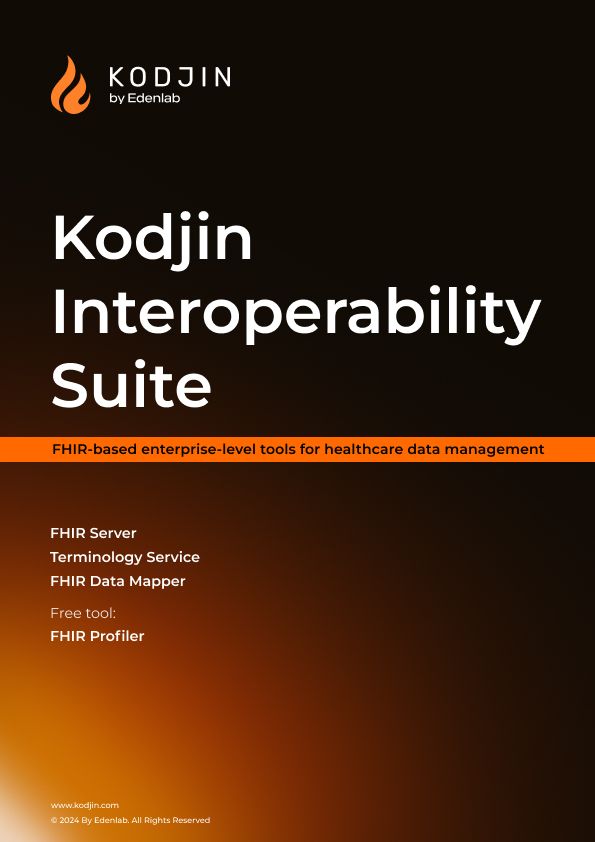Fast Interoperability Healthcare Resources (FHIR) is a standard for exchanging healthcare data that has been gaining popularity since its release in 2014. This standard resulted in emerging various FHIR software development companies and contributed to the wide recognition of healthcare data interoperability importance.
However, the main reason for the wide adoption of the FHIR standard is because of a rule published by the Office of the National Coordinator for Health IT (ONC) that requires using FHIR APIs for data exchange between providers, payers, and patients.
Despite numerous advantages, FHIR implementation requires specific hard skills and an understanding of healthcare regulatory intricacies. Thankfully, there are FHIR software development companies that help stakeholders overcome possible implementation challenges and take advantage of the FHIR standard.
What makes FHIR unique?
FHIR was created in response to the need for establishing the exchange of interoperable healthcare data. As a result, it contains the best features of previous HL7 standards, including V2, V3, and CDA. In a previous article, we compared FHIR VS. HL7 and shared message examples and key characteristics of the most popular HL7 standards.
The FHIR standard uses modern approaches and web technologies. In addition, the FHIR data model, also known as “resources,” can be tailored to the specific need of any healthcare project, which was not the case with previous standards provided by the HL7 organization.
Here are some of the best FHIR features:
- Focus on implementers
- Support for common healthcare scenarios
- Uses proven web technologies
- Human-readable resources
- Open-source libraries of FHIR Implementation Guides
- Contemporary data governance
In summary, FHIR is a game-changer in the healthcare industry, built to address current and future needs. With its focus on ease of implementation, support for commonly used workflows, and modern governance capabilities, FHIR is poised to become the go-to standard for healthcare data exchange.
Read also: The Key Features of the FHIR R5
Top FHIR Software Development Companies
Edenlab – Top FHIR software development company
Edenlab is a team of FHIR developers with a high level of knowledge in the healthcare domain and expertise in developing solutions for enterprises. The team has over seven years of experience delivering high-quality solutions to large-scale systems.
Core Services: As a leading FHIR software development company, they provide FHIR-based solutions, including the ONC-compliant Kodjin FHIR Server and Terminology Service. The FHIR toolset ensures high performance for any healthcare data. The Kodjin FHIR Server ensures compliance with the G10 criterion of the ONC Health IT Certification Program. Additionally, Edenlab’s FHIR experts can design high-load projects with balanced usage of FHIR, considering the opportunities and limitations of the HL7 standard. FHIR server testing is an integral part of their process to ensure optimal performance and compliance with industry standards.
Founded in: 2014, and since then, they have been delivering high-quality FHIR-based solutions to various clients in the healthcare industry.
Headquartered in: Tallinn, Estonia.
Number of Employees: 100 seasoned professionals.
Data Security: The Kodjin FHIR Server is ONC and HIPAA-compliant. Edenlab is one of the SMART on FHIR development companies and has experience working with architecture that offers numerous security benefits to healthcare actors.
Firely
Firely is one of the FHIR vendors that provides FHIR software and services to healthcare providers, health IT vendors, consulting firms, and national health authorities. Firely is dedicated to creating software solutions for FHIR data modeling, FHIR implementation, and FHIR app development.
Core Services: Firely’s core services include FHIR software development, consultancy, and training courses. The team creates an FHIR server and the official, open-source repository of FHIR Implementation Guides at simplifier.net.
Founded in: 1993 (has been involved in FHIR since 2012).
Headquartered in: Amsterdam, the Netherlands.
Data Security: Firely provides customized FHIR solutions for interoperability, regulations, and local security standards, such as MedMij (you can find more information about this standard and the primary healthcare regulations and laws in Europe in our material about regulatory compliance in healthcare).
Smile CDR
Smile CDR is a health technology company that provides FHIR-compliant health IT solutions. The team offers a health data integration platform, services such as patient data access, and health information exchange.
Core Services: The SMILE CDR’s health data integration platform includes data management and storage solutions, custom API development, and an FHIR server.
Founded in: Smile launched the first commercial release of Smile CDR in 2016.
Headquartered in: Toronto, Ontario, Canada.
Number of Employees: 250 employees.
Data Security: Smile CDR has achieved external certifications and proven standards, such as HIPAA compliance, which has one of the harshest penalties for privacy and security violations.
Choosing a FHIR Software Development Partner
FHIR implementation can be complex for those who are new to the standards. Therefore, choosing the right software development company is essential for successful FHIR implementation. We’ve highlighted some important aspects to consider when choosing FHIR software development firms for partnership.
Read Also: FHIR Use Cases in Germany
Successful Case Studies
Tracking the record of successful FHIR implementation case studies should be the first research step. A team that provides a portfolio of case studies has proven experience in FHIR implementation. In addition, studying portfolios will help you learn about the approaches of FHIR software development agencies, the technology stack, and strategies used for overcoming FHIR implementation challenges.
When evaluating companies’ case studies, it is essential to look at the variability of use cases, for instance, implementing FHIR in hospitals and big clinical repositories. The scale and complexity of a company’s projects speak for themselves. If a healthcare software development company can handle big data in healthcare, working with such FHIR professionals is worth considering.
Experience
Once an FHIR software development company with a decent track record of FHIR implementation cases is found, examine the depth of the FHIR experience. When developing and implementing FHIR software, working with certified specialists is critical for ensuring success. The best FHIR software development companies prioritize the training and certification of their analytics and developers through HL7. With this expertise, a company can deliver reliable and FHIR-first healthcare solutions.
Also, consider the breadth of their experience across various domains and the profundity of their technical expertise. Use cases must demonstrate a deep understanding of FHIR and related technologies that ensure the capacity to deliver high-quality solutions.
Domain Expertise
Complex healthcare challenges require a unique approach and an understanding of healthcare workflows. Moreover, healthcare is a heavily regulated industry with ever-changing standards and severe penalties for compliance failure. Therefore, superb knowledge of healthcare standards is the key to regulatory compliance in healthcare.
Cost-Effectiveness
In an ideal world, the healthcare industry must be driven by the desire to make this world a better place for its citizens. However, in the real world, entrepreneurship is all about creating value, even in healthcare. Therefore, choosing an FHIR software development company offering competitive pricing is wise.
Consider the ability of a company to deliver solutions on time and within budget. Give preference to collaborating with a more cost-effective company compared to other firms. Also, ensure the company can stick to the time frame since delays can become monetary losses.
Choosing the right FHIR application development company is necessary for healthcare organizations looking to implement FHIR solutions. By considering factors such as successful FHIR implementation case studies, experience, domain expertise, and cost-effectiveness, healthcare organizations can find a company that can deliver high-quality solutions that meet their specific needs and provide value to their business.
Read also: FHIR’s Role in Mobile Health App Development
Case Studies of Successful FHIR Implementations
Transforming the Ukrainian healthcare system with the National E-Health System.
With most medical data still being processed using paper documents and a low level of computer literacy among GPs, the Ukrainian healthcare system required an overhaul. The Edenlab team has built a modern, fault-tolerant national health system from scratch to ensure maximum transparency, interoperability, and accessibility of healthcare data for over 32 million users.
The engineers at Edenlab built a microservice architecture with two layers: a central component including national registries, classifiers, terminology services, and connected private EHR systems. The team deployed the architecture to Kubernetes on Docker and used Elixir as the primary back-end language for better scalability and speed.
Edenlab’s National E-Health System ensures data integrity and security with electronic digital signatures and blockchain-like algorithms. Edenlab’s National E-Health System is one of the biggest worldwide FHIR implementation projects so far.
One of the largest third-party administrators (TPAs) in Hong Kong
To process claims for multiple insurance companies, Edenlab developed an auto-adjudication engine for Heals.Asia. It is one of the largest TPAs in Hong Kong and a successful implementation of the FHIR standard. The engine is essentially a rule engine that supports complex limits and constraints such as deductibles, co-pays, co-insurance, out-of-pocket maximums, family limits, and minimum/maximum patient age.
Heals.Asia, successfully implemented the FHIR standard using an FHIR facade solution.
The team created profiles for the TPA and determined the required FHIR resources and corresponding business processes. When all necessary profiles, FHIR extensions, and terminologies were ready, the team ran the Kodjin FHIR Server. As a result, external providers could access the data from the Kodin FHIR Server via an FHIR-compliant API.
The project’s challenges included the non-structured and non-formalized storage of fragmented insurance plans. The team resolved this issue by mapping custom data structures to FHIR standards and developing custom FHIR profiles for Coverage, CoverageEligibilityRequest, CoverageEligibilityResponse, Claim, ClaimResponse, etc.
The team formalized and structured the insurance plans to support automatic adjudication by building a domain-specific model covering various requirements. The technical implementation of the auto-adjudication engine involved:
- Building APIs for insurance plan management
- Bulk import/export of insurance plans with FHIR Bulk API
- FHIR-based API eligibility checks
The successful implementation of this project demonstrates the potential of FHIR in developing healthcare applications that require data exchange between different healthcare systems. In addition, the project highlights the importance of formalizing and structuring healthcare data for better efficiency and lower costs in the healthcare industry.
National Clinical Data Repository
The National Clinical Data Repository (NCDR) is a digital database created as part of the E-Health project in Ukraine. It ensures data-driven decision-making within healthcare and enables government officials to obtain objective statistical information about national health.
One of the significant challenges faced by the team was that only 5% of healthcare organizations were using any Electronic Health Record (EHR) systems when the NCDR was created. As a result, all business processes had to be thought through from scratch. They also had to ensure data accuracy and reliability, making doctor fraud impossible and ensuring non-disputability.
To ensure data reliability and health record deduplication, the Edenlab team built the National Master Patient Index (MPI) system, ensuring each patient had a unique personal health record. In our article about the importance of EHR interoperability, we described the cycle of patient information exchange between two medical systems in different systems using the MPI (Master Patient Index) database.
The Edenlab team created the Patient Summary as a solution that ensures access to the most critical information about the patient during the patient’s first visit and to paramedics that require specific medical information during emergencies, for example, when a patient is unconscious.
The team used pseudonymization of health records and the Attribute-Based Access Control Module (ABAC) to protect personal information from unauthorized access. The project took six months to complete, and at present, 620 million electronic medical records have been created in the e-health system.
ONC-certified FHIR API for the patient and public services
The ONC is responsible for promoting the development and adoption of health information technology (HIT) and ensuring the technology improves the quality of healthcare delivery and patient outcomes. The ONC has been advocating for the use of FHIR-based APIs to facilitate interoperability among different HIT systems, which has the potential to enhance patient care and reduce healthcare costs.
The FHIR API enables healthcare providers to securely share patient health information with other healthcare providers, public health agencies, and patients. In addition, the FHIR application development companies use FHIR API to create patient-facing apps allowing patients to access their health information securely.
The main goal of the ONC certification is to ensure RHR systems meet strict security and privacy standards and comply with the major regulatory requirements in the U.S., such as the Cures Act Final Rule. ONC-certified systems can seamlessly exchange patients’ data via FHIR APIs.
Conclusion
FHIR implementation requires a deep understanding of the healthcare domain. Hence, choosing FHIR companies with a good portfolio of successful FHIR implementation use cases can help to overcome implementation challenges.
Given technical expertise, understanding of healthcare workflows, and cost-effective pricing will guarantee that you receive high-quality solutions within your budget. Edenlab is an excellent option for healthcare stakeholders looking for an FHIR consulting company. Our team is ready to share more successful FHIR implementation case studies and develop the best FHIR solution for your business needs.
FAQ
Why should I consider hiring a FHIR software development company for my healthcare project?
Hiring an FHIR software development company allows for keeping your healthcare project updated with the ever-changing healthcare field and regulatory requirements. Top FHIR software development companies know the latest rules and standards for managing, storing, sharing, and protecting data. They monitor updates and adjust their work to ensure your project follows the rules.
Are these FHIR software development companies suitable for startups or established enterprises?
FHIR allows for interoperability within projects of any size. Hence, both startups and enterprises can benefit from hiring a team of professional FHIR experts.
Do these companies offer post-development support and maintenance for FHIR-integrated applications?
Post-development support and maintenance for FHIR-integrated applications vary among companies. Before signing any contracts, you must check with each company individually to ensure you know the specific support and maintenance services they offer.





